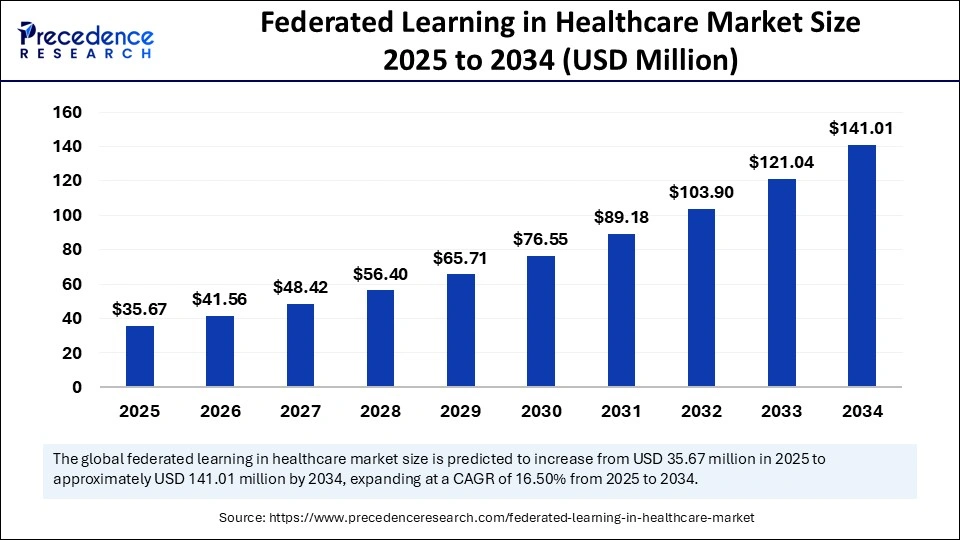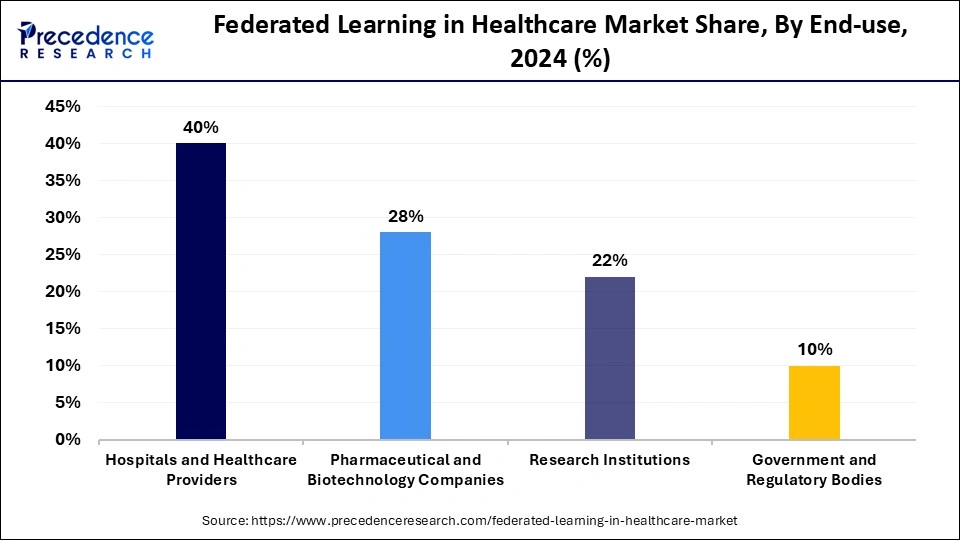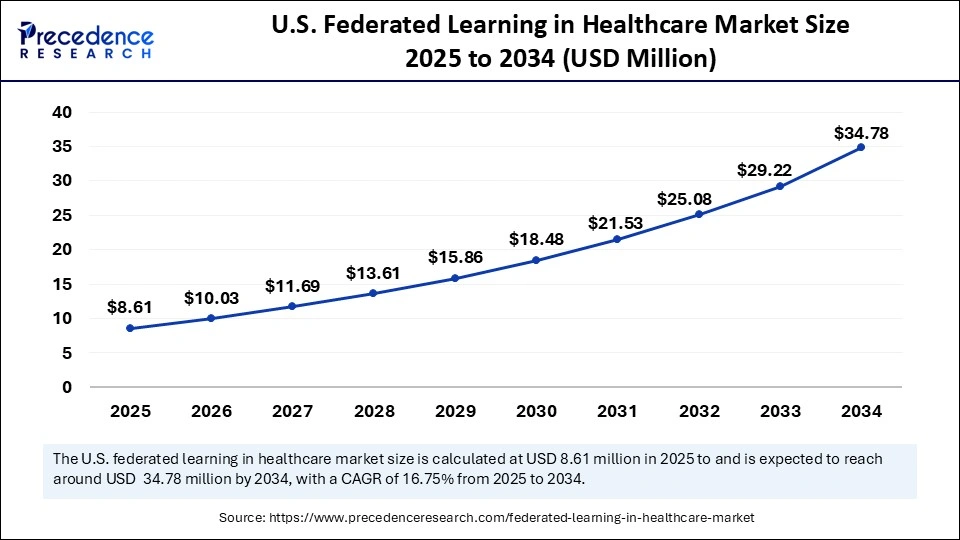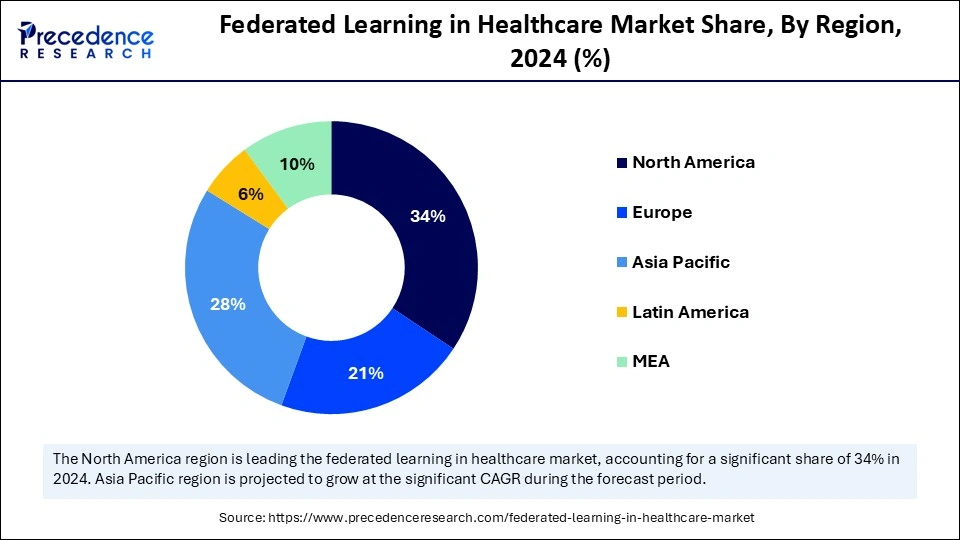What is Federated Learning in Healthcare Market Size?
The global federated learning in healthcare market size accounted for USD 35.67 million in 2025 and is predicted to increase from USD 41.56 million in 2026 to approximately USD 141.01 million by 2034, expanding at a CAGR of 16.50% from 2025 to 2034. The market is witnessing significant growth due to the rising concerns about data privacy and security in the healthcare sector. The increasing adoption of AI-based models to transform the delivery of healthcare services by improving diagnosis, treatment, and research further supports market growth.

Market Highlights
- North America dominated the global market with the largest share of 34% in 2024.
- Asia Pacific is expected to grow at a double digit CAGR of 18% during the forecast period.
- By application, the drug discovery & development segment captured the largest share of the market in 2024.
- By application, the remote patient monitoring segment is seen to grow at a significant rate in the upcoming period.
- By deployment mode, the on-premises segment held the largest market share in 2024.
- By deployment mode, the cloud-based segment is projected to expand rapidly in the coming years.
- By end-use, the hospitals and healthcare providers segment contributed the highest market share of 40% in 2024.
- By end-use, the pharmaceutical & biotechnology companies segment is expected to witness the fastest growth during the forecast period.
Strategic Overview of the Global Federated Learning in Healthcare Industry
Federated learning in healthcare is a segregated machine learning approach that allows multiple healthcare institutions to collaboratively train AI models without sharing raw patient data. This is achieved by training models locally on data specific to each institution and then sharing only the updated model parameters with metadata to a central server for aggregation. This market comprises technologies, services, and solutions, enabling federated learning in the healthcare sector. This includes the software platforms, algorithms, and support services required to execute and sustain federated learning systems.
How AI is Changing the Federated Learning in Healthcare Market?
Artificial Intelligenceis significantly impacting the federated learning in healthcare market by providing the underlying machine learning models and computational power that make FL systems effective. The AI algorithms (including machine learning and deep learning) enable the extraction of complex patterns and predictions from massive datasets, which, when applied within an FL framework, revolutionize diagnostics, drug discovery, and treatment planning while strictly preserving patient privacy and regulatory compliance. This synergy is driving market growth by allowing hospitals, clinics, and research institutions to collaboratively train robust AI models on diverse, decentralized patient data without sharing raw, sensitive information.
Federated Learning in Healthcare Market Growth Factors
- Concerns About Data Privacy and Security: Federated learning reduces concerns about data privacy and security by empowering institutions to collaborate on AI model development without sharing sensitive patient data.
- Ameliorated Model Accuracy: Federated learning can develop AI models by leveraging data from multiple institutions. Those AI models are more accurate and robust than models trained on the data of a single institution.
- Cost Effectiveness: Federated learning can help abate the cost of AI development and deployment by leveraging existing data sources and reducing the demand for expensive data transfer.
- Speeding up AI Development: Federated learning can speed up the development of AI models by allowing researchers to combine knowledge from multiple institutions without the requirement for complex data integration or data sharing agreements.
Market Outlook
- Market Growth Overview: The Federated Learning in Healthcare market is expected to grow significantly between 2025 and 2034, driven by the advancement in AI algorithms, edge computing, and privacy-enhancing technologies, the growing need for advanced data analytics to enhance clinical decision-making, optimize treatment personalization, and improve patient outcomes.
- Sustainability Trends:Sustainability trends involve Democratic Data Access and Equity (Social), decentralization and reduced carbon footprint, and enhancing data privacy and trust.
- Major Investors: Major investors in the market include Google LLC (TensorFlow Federated), NVIDIA Corporation (NVIDIA FLARE and hardware), Microsoft (Azure cloud infrastructure and research initiatives), and IBM.
- Startup Economy: The startup economy in platform development, privacy-enhancing technologies, and niche clinical applications.
Market Scope
| Report Coverage | Details |
| Market Size in 2025 | USD 35.67 Million |
| Market Size in 2026 | USD 41.56 Million |
| Market Size by 2034 | USD 141.01 Million |
| Market Growth Rate from 2025 to 2034 | CAGR of 16.50% |
| Dominating Region | North America |
| Fastest Growing Region | Asia Pacific |
| Base Year | 2024 |
| Forecast Period | 2025 to 2034 |
| Segments Covered | Application, Deployment Mode, End-use, Regions |
| Regions Covered |
North America, Europe, Asia-Pacific, Latin America, and Middle East & Africa |
Market Dynamics
Drivers
Increasing Demand for Training AI Models
The primary driver for the federated learning in healthcare market is the increasing demand for training Artificial Intelligence models while maintaining patient data privacy and security. It also offers compliance with privacy laws by allowing institutions to train models locally and only share model updates by reducing the requirement to transfer raw patient data. Moreover, it allows institutions to collaborate on model development without sharing raw patient data by maintaining compliance with regulations like HIPAA and GDPR. Federated learning empowers different healthcare institutions to contribute data for AI model development without physically sharing the raw data by preserving patient confidentiality. This is particularly important in healthcare due to data is highly sensitive and privacy regulations are strict.
Restraint
Data Privacy and Security Concerns
Data privacy and security concerns hamper the growth of the federated learning in healthcare market. The lack of standardized protocols and the complexity of compliance requirements like GDPR, CCPA, and the EU AI Act further create challenges. The sensitivity of medical data makes it a prime target for breaches and cyberattacks. Sharing data across different healthcare institutions, which is a fundamental aspect of federated learning, further increases concerns about data breaches and unauthorized access.
Opportunity
Integration of Federated Learning with Other Technologies
The key future opportunity in the federated learning healthcare market lies in the integration of federated learning with other technologies, especially blockchain, to enhance data security and privacy while facilitating collaboration across institutions to build AI models that can learn from diverse, decentralized datasets. This involves combining federated learning with foundation models to enhance medical diagnostics and personalized treatments while maintaining patient privacy and security.
- In August 2023, Kakao Healthcare's data platform uses Federated Learning to enable secure analysis of medical data from multiple hospitals, improving data usability and prediction accuracy by storing and managing sensitive data such as personal and corporate information within individual environments.
Segment Insights
Application Insights
The drug discovery & development segment captured the largest share of the federated learning in healthcare market in 2024 because of the potential of AI to speed up drug discovery and development while simultaneously addressing data privacy and security concerns. AI algorithms are being used in virtual screening to identify promising drug candidates by analyzing their properties and potential biological activity. Federated learning enables secure data sharing across institutions by allowing for collaborative research and model training without the necessity to centralize sensitive patient data. This is particularly valuable in drug discovery, where diverse datasets are required for model training and precise predictions.
The remote patient monitoring segment is expected to grow at a significant rate in the upcoming period. The growth of the segment is attributed to the increasing demand for data privacy and the rising need for personalized, dynamic care management, by enabling the collection of real-time data and insights into the health of patients. Remote patient monitoring depends on collecting data from different sources like wearable devices, home monitoring systems, and patient-reported data, which can be sensitive and need privacy protection. Federated learning allows multiple institutions to train a single model using their data without sharing the raw data, addressing these privacy concerns by leveraging the collective expertise of various healthcare providers.
Deployment Insights
The on-premises segment held the dominant share of the federated learning in healthcare market in 2024. This is mainly due to the increased demand for rigorous data privacy and security controls in healthcare settings. On-premises deployment allows sensitive patient data to be contained within local servers by lowering the risk of external exposure and enabling customized security measures. Furthermore, on-premises solutions enable healthcare organizations to execute customized security measures and protocols tailored to their specific demands and risk tolerance.
The cloud-based segment is projected to expand rapidly in the coming years, owing to its scalability, flexibility, and cost-effectiveness. Cloud-based solutions enable data collaboration by maintaining patient privacy. Cloud-based federated learning allows healthcare organizations to train AI models on segregated data sources without sharing raw patient data, complying with data privacy regulations. Cloud solutions often provide lower upfront costs together with can be easily integrated with other healthcare IT solutions like Electronic Health Records and telehealth platforms by developing a thorough and productive healthcare ecosystem.
End-use Insights
The hospitals & healthcare providers segment led the federated learning in healthcare market with the largest share in 2024. This is mainly due to the increased need for secure and collaborative data analysis to boost patient care and clinical decision-making. Federated learning empowers hospitals to access data from various sources while maintaining patient privacy because they need to comply with strict regulations regarding patient data privacy, such as HIPAA, by enabling them to train AI models without sharing sensitive patient information. This is critical for developing personalized treatment plans, predicting patient outcomes, and improving diagnostics.

The pharmaceutical & biotechnology companies segment is expected to witness the fastest growth during the forecast period, owing to their heavy reliance on data for drug discovery, clinical trials, and personalized medicine, all of which benefit significantly from the ability of federated learning to enable collaborative research while maintaining patient privacy. Federated learning allows these companies to analyze diverse datasets from various sources by contributing to more accurate predictions and preferred outcomes in drug development.
Regional Insights
U.S. Federated Learning in Healthcare Market Size and Growth 2025 to 2034
The U.S. federated learning in healthcare market size is exhibited at USD 8.61 million in 2025 and is projected to be worth around USD 34.78 million by 2034, growing at a CAGR of 16.75% from 2025 to 2034.

North America held the dominant share of the federated learning in healthcare market in 2024. This is mainly due to its advanced healthcare infrastructure and widespread access to digital technologies, enabling the seamless execution of federated learning. Increased investments in AI technologies and widespread adoption of digital health technologies such as electronic health records, telemonitoring, and AI-powered diagnostics further bolstered the growth of the market. Stringent data privacy regulations also contributed to the region's market dominance. This dominance is further strengthened by initiatives like the California Consumer Privacy Act (CCPA), which encouraged the adoption of federated learning as a privacy-preserving strategy to collaborative AI model training.
The U.S. plays a major role in the North American federated learning in healthcare market. This is mainly due to its regulatory environment that supports privacy-preserving technologies like federated learning. The U.S has a well-developed healthcare infrastructure, offering fertile ground for federated learning adoption. US-based healthcare providers, pharmaceutical companies, and research institutions are actively adopting federated learning to enhance data privacy and improve clinical outcomes by preventing breaches and unauthorised access.
Asia Pacific is anticipated to witness the fastest growth in the market during the forecast period. This is due to an increasing healthcare investment, a growing aging population, the expansion of medical infrastructure, and the rise in the adoption of digital health technologies, including those powered by AI. This is further spurred by the large and diverse healthcare sector of the region and the demand for secure data sharing and collaboration. There is a rising adoption of AI technologies, particularly in areas like drug discovery and development.
China is expected to have a stronghold on the Asia Pacific federated learning in healthcare market. This is due to its massive population, creating a high demand for healthcare services and technological solutions. Furthermore, China is actively adopting digital technologies, including AI and machine learning, in healthcare for different applications like diagnosis, treatment, and remote monitoring. Hospitals in China are utilizing federated learning to train a model for predicting heart failure risk by leveraging data from multiple hospitals, as well as keeping individual patient information confidential.

India is experiencing rapid growth in the market due to the increasing healthcare spending and a focus on digital transformation. Government investments and increasing private spending are improving healthcare infrastructure and innovation, creating opportunities for federated learning technology. Pharmaceutical companies in India, such as Sai Life Sciences, Dr. Reddy's Laboratories, and Sun Pharmaceutical Industries Limited, are using federated learning to develop a personalized drug development strategy.
Europe is considered to be a significantly growing area. The growth of the federated learning in healthcare market in the region is driven by its strong data privacy regulations, specifically the General Data Protection Regulation. This drives the demand for segregated data processing solutions like federated learning, which aligns with the principle of keeping data close to its source and reducing security risks. The region's advanced healthcare system and leading health tech firms and research institutions further accelerate federated learning adoption for applications like personalized medicine and drug discovery. The HealthChain project in France predictsa treatment response using federated learning for breast cancer and melanoma patients by helping oncologists determine the most effective treatment for each patient.
Federated Learning in Healthcare Market Value Chain Analysis
- Technology Providers
These companies focus on the underlying hardware, software, and algorithms that enable FL, including specialized processors, privacy-enhancing techniques and open-source frameworks.
Key Players: NVIDIA Corporation, Intel Corporation, Google (through TensorFlow Federated), Microsoft (through Project Florida and cloud services), IBM, and startups like Secure AI Labs. - FL Platform Developers
This stage involves creating and deploying the proprietary platforms that orchestrate the FL process across various healthcare institutions.
Key Players: Owkin Inc., Lifebit, Sherpa.ai, Rhino Health, and companies offering enterprise FL platforms. - Healthcare Institutions & Data Holders
As the end-users and data providers, hospitals, clinics, and research institutions participate in the FL network.
Key Players: Mayo Clinic - Service & Consulting Providers
This final stage involves providing integration, training, and ongoing support services to healthcare institutions implementing FL.
Key Players: Idea Usher, Accenture, and other tech consulting firms specializing in healthcare AI and data privacy.
Key Players in Federated Learning in Healthcare Market and Their Offerings
- FedML provides an open-source platform designed to facilitate the research and development of federated learning technologies for academic and commercial use.
- GE Healthcare integrates artificial intelligence capabilities into its medical devices and software solutions, leveraging federated learning to develop more accurate diagnostic algorithms without centralizing sensitive patient data.
- Google LLC contributes to the market with the development of TensorFlow Federated (TFF), an open-source framework for implementing federated learning on decentralized data.
- Health Catalyst is a data analytics provider that supports healthcare organizations in leveraging their data for insights and improvements, which can include the infrastructure needed to implement federated learning projects.
- IBM Corporationis a major player in healthcare AI, offering solutions that utilize federated learning to build predictive models across its client base without exchanging raw data.
- Medtronic, a leading medical device company, explores advanced data analytics and potentially federated learning techniques to optimize device performance and patient care pathways.
- Microsoft contributes to the market through its Azure cloud platform and initiatives like Project Florida, which explore federated learning applications in healthcare. Their technology provides the scalable and secure cloud infrastructure necessary for orchestrating and managing large-scale federated learning projects across different healthcare providers.
- NVIDIA Corporation provides the powerful hardware, particularly their GPUs, and software frameworks like NVIDIA FLARE, which are essential for running the computationally intensive AI models used in federated learning.
- Owkin, Inc. is a leading startup in the federated learning in healthcare market, specializing in building a global network where medical institutions collaborate on AI model training while data remains secure behind institutional firewalls.
- Siemens Healthineers leverages AI and data analytics as a core part of its medical imaging and diagnostic portfolio, potentially incorporating federated learning to train robust algorithms across its global network of installed equipment.
Recent Developments
- In January 2025, Owkin launched K1.0 Turbigo, an AI-powered operating system for drug discovery and diagnostics, using federated learning with multimodal patient data. Owkin K1.0 has access to patient data and samples from Owkin's federated patient data network of top research institutions.
- In July 2022, Aster Innovation and Research Centre, Intel Corporation, and CARPL collaborated to launch ‘Secure Federated Learning Platform.' This collaboration enabled the development of AI-driven health tech solutions where data can securely reside where it is generated. The collaboration will boost innovation in drug discovery, diagnosis, genomics, and predictive healthcare.
Segments Covered in the Report
By Application
- Medical Imaging
- Drug Discovery & Development
- Electronic Health Records (EHR) Analysis
- Remote Patient Monitoring
- Clinical Trials
By Deployment Mode
- On-premises
- Cloud-based
By End-use
- Hospitals & Healthcare Providers
- Pharmaceutical & Biotechnology Companies
- Research Institutions
- Government & Regulatory Bodies
By Region
- North America
- Europe
- Asia Pacific
- Latin America
- Middle East & Africa
For inquiries regarding discounts, bulk purchases, or customization requests, please contact us at sales@precedenceresearch.com
Frequently Asked Questions
Ask For Sample
No cookie-cutter, only authentic analysis – take the 1st step to become a Precedence Research client
 Get a Sample
Get a Sample
 Table Of Content
Table Of Content




 sales@precedenceresearch.com
sales@precedenceresearch.com
 +1 804-441-9344
+1 804-441-9344
 Schedule a Meeting
Schedule a Meeting